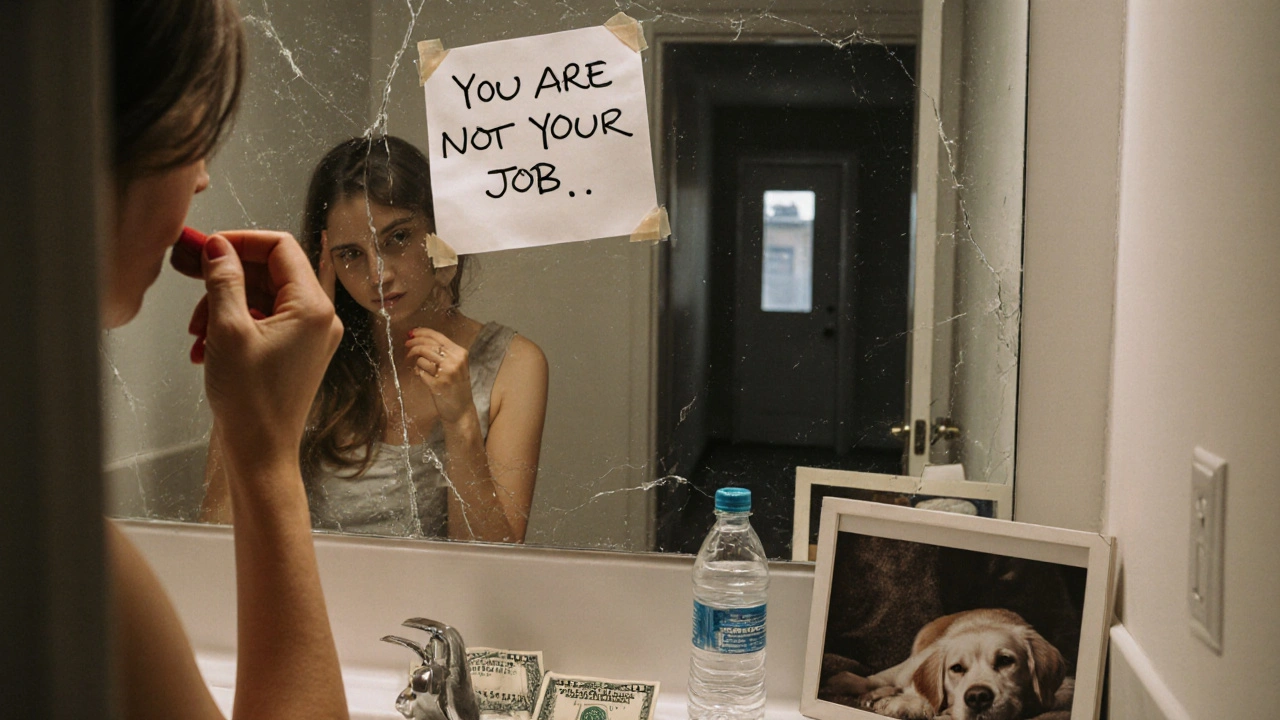Sex work is work. It’s physically demanding, emotionally intense, and often done under conditions that make rest, boundaries, and safety hard to hold onto. Many sex workers report feeling drained, numb, or disconnected-not just from clients, but from themselves. This isn’t weakness. It’s burnout. And it’s not something you just have to live with.
What Occupational Burnout Looks Like in Sex Work
Burnout doesn’t mean you’re tired after a long shift. It means you’ve been running on empty for months, maybe years. You show up, do the job, and feel nothing afterward. You stop enjoying things you used to love. You snap at friends. You skip meals. You don’t bother setting boundaries anymore because it feels easier to just say yes.
A 2023 study of sex workers in Australia, Canada, and the Netherlands found that 68% of participants reported symptoms of chronic emotional exhaustion, and 52% said they had stopped seeing therapists or counselors because they couldn’t afford it-or because they didn’t feel understood. This isn’t rare. It’s systemic.
Unlike office jobs, sex work often lacks structure. No paid sick days. No HR department. No coworkers to vent to. You’re alone with the emotional weight of every interaction. Over time, that weight crushes your sense of self.
Self-Care Isn’t Bubble Baths-It’s Survival
When people talk about self-care, they show you candles and face masks. That’s not enough. For sex workers, self-care is about reclaiming control over your body, your time, and your energy.
Here’s what actually works:
- Setting non-negotiable limits-like no back-to-back clients, no services you don’t want to do, no working when you’re sick or emotionally raw. These aren’t luxuries. They’re safety protocols.
- Scheduling downtime-not just between clients, but between days. Two full days off every week isn’t indulgent. It’s necessary to prevent nervous system collapse.
- Physical grounding-walking barefoot on grass, taking cold showers, lifting weights, dancing in your room. These aren’t ‘wellness trends.’ They’re ways to reconnect with your body after it’s been treated like a tool.
- Financial boundaries-saving a set amount from every job, even if it’s $20. Having money you didn’t earn from clients gives you power. It reminds you: you are not your income.
One sex worker in Melbourne told me she started keeping a small notebook by her bed. Every night, she wrote down one thing she did that day that was for her-not for a client, not for someone else. "It was things like, ‘I drank water instead of wine,’ or ‘I called my sister even though I was too tired.’" After three months, she said she felt like herself again.
Safety Isn’t Just About Screening Clients
Safety in sex work goes beyond checking IDs or sharing location with a friend. It’s about building systems that protect your mental and emotional health too.
Many sex workers use apps like Redbook or My Sex Worker Network to log client details and share warnings. But safety also means:
- Having a code word with a trusted person so you can signal distress without saying it out loud
- Keeping a backup phone with emergency contacts and no client history
- Working with others when possible-even if it’s just sharing a space with another worker, even if you don’t talk
- Leaving the door unlocked so you can exit fast, even if it feels risky
One worker in Sydney switched to indoor work only after two bad experiences outside. She said, "I used to think being tough meant pushing through. Now I know being smart means choosing safety over ego."

Therapy Doesn’t Have to Be Expensive
Therapists who understand sex work exist. They’re just hard to find. And they’re often out of reach financially.
But there are alternatives:
- Peer support groups-like the Sex Worker Outreach Project (SWOP) in Perth, which meets weekly and is free. No judgment. No advice. Just space to speak.
- Online forums-like the SWAN Collective (Sex Worker Advocacy Network), where workers share coping strategies, resources, and just vent.
- Art and writing-journaling, painting, poetry. One worker in Adelaide started writing letters to her past self after each job. "I’d write, ‘You didn’t deserve that.’ Or ‘You did good today.’ It helped me remember I was still here."
Some organizations offer free or sliding-scale therapy specifically for sex workers. In Australia, Sex Work Australia partners with psychologists trained in trauma-informed care. You don’t need insurance. You don’t need to disclose your work. Just show up.
When You Feel Like Quitting
There are days-weeks, even-when you wonder if it’s worth it. That’s normal. But quitting isn’t always the answer. Sometimes, you just need to change how you do it.
Ask yourself:
- Is it the work itself that’s draining me, or the conditions around it?
- Have I stopped saying no because I’m afraid of losing income-or because I’ve forgotten I have the right to say no?
- What would my life look like if I cut back to three days a week? Could I still survive? Would I feel more human?
There’s no shame in reducing your hours. There’s no shame in taking a break. There’s no shame in switching to online work, or moving to a safer location, or stopping entirely. What’s dangerous is staying stuck because you think you have no options.

You Are Not Your Job
Sex work doesn’t define you. It’s something you do. It’s not who you are. But when you’re burned out, it’s easy to forget that.
Reconnecting with your identity outside of work matters. Watch a movie you loved as a kid. Re-read a favorite book. Call someone who knew you before this job. Do something that reminds you: you existed before clients, and you’ll exist after.
One worker in Brisbane started volunteering at an animal shelter on her days off. "I didn’t think I’d like it. But holding a scared dog and seeing them relax… it reminded me I could still make someone feel safe. Even if it wasn’t for money."
It’s Okay to Ask for Help
Asking for help isn’t failure. It’s strategy. You wouldn’t drive a car with no oil and expect it to run. Why do the same with your body and mind?
If you’re feeling overwhelmed, reach out. Even if it’s just one person. Even if it’s an anonymous message. You don’t have to explain everything. You don’t have to be brave. Just say: "I’m not okay." That’s enough.
There are people who will listen. There are systems that can help. You don’t have to carry this alone.
Can sex workers really prevent burnout, or is it inevitable?
Burnout isn’t inevitable-it’s a sign that the system isn’t working for you. Many sex workers reduce or eliminate burnout by setting strict boundaries, taking regular breaks, accessing peer support, and prioritizing physical and emotional rest. It’s not about being stronger. It’s about being smarter about how you protect yourself.
What if I can’t afford therapy or self-care tools?
You don’t need expensive tools. Free peer groups, journaling, walking in nature, cold showers, and calling a trusted friend are all valid forms of self-care. Many organizations, like SWOP and SWAN, offer free support. Saving even $10 a week for a hot meal or a movie ticket counts as self-care. It’s about small, consistent acts of reclaiming your time and dignity.
Is it safe to talk to a therapist about being a sex worker?
Yes, if you choose a therapist trained in trauma-informed or sex-positive care. In Australia, organizations like Sex Work Australia vet therapists who understand the realities of sex work. You don’t have to disclose your job to get help-many therapists work with clients using neutral terms like "service work" or "independent work." Your privacy is protected.
How do I know if I’m experiencing burnout or just having a bad week?
Burnout lasts. It’s not a bad day-it’s weeks or months of feeling empty, detached, irritable, or numb. You might feel guilty for not being "strong enough," or you might stop caring about things you used to enjoy. If you’ve been feeling this way for over a month, it’s burnout-not just stress.
Can I still be safe if I work alone?
Yes, but safety requires more structure. Use apps to log clients, keep a backup phone, have a code word, and never skip your check-in routine. Working alone doesn’t mean working without support. Connect with other workers online, even if you never meet in person. Community keeps you safer than solitude.
What Comes Next
Reducing burnout isn’t a one-time fix. It’s a daily practice. Some days you’ll nail it. Other days, you’ll forget to eat. That’s okay. Progress isn’t perfect.
Start small. Pick one thing from this list and try it this week. Maybe it’s saying no to a client you don’t want to see. Maybe it’s taking a walk without your phone. Maybe it’s texting a friend and saying, "I’m tired."
You deserve to feel safe. You deserve to feel whole. And you don’t have to earn that.
